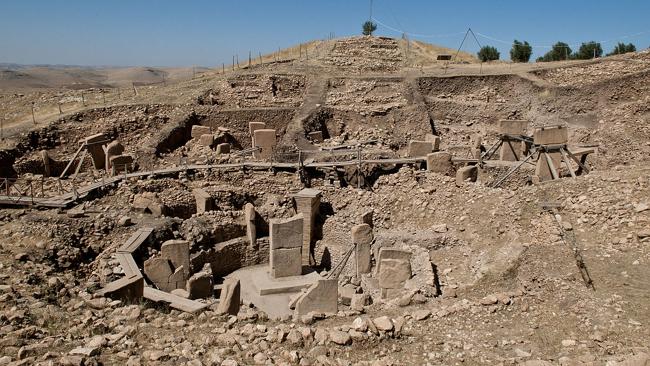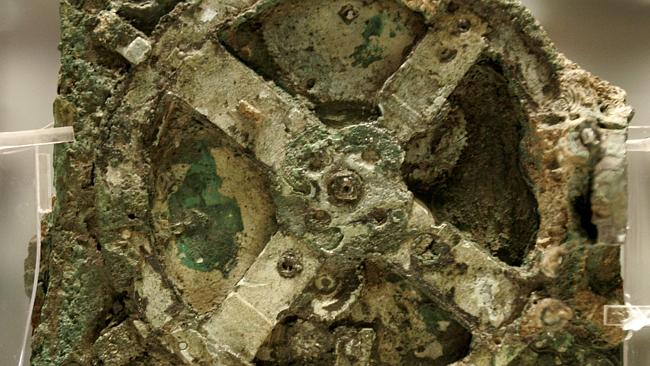It looks like you're using an Ad Blocker.
Please white-list or disable AboveTopSecret.com in your ad-blocking tool.
Thank you.
Some features of ATS will be disabled while you continue to use an ad-blocker.
share:
Hey all,
I came across this article and thought it was worth a share here. There's not much to say really, other than that a lot of the stuff in the list is fascinating, even if some of it is well known. I will post a couple of the excerpts, but to see it all, you will have to click the following link:
goo.gl...
goo.gl...
I came across this article and thought it was worth a share here. There's not much to say really, other than that a lot of the stuff in the list is fascinating, even if some of it is well known. I will post a couple of the excerpts, but to see it all, you will have to click the following link:
goo.gl...
Gobekli Tepe
Every so often, a discovery happens that forces us to re-imagine what we think we know about humanity, and how we got to where we are today. Turkey’s Göbekli Tepe is certainly one such discovery. The site, located at the top of a mountain ridge, is composed of more than 200 pillars, up to 20 feet in height and weighing up to 20 tonnes, arranged in roughly 20 circles. Many of the pillars have predatory animals engraved on them. And none of this would be surprising if it was built in, say 2000 B.C., but Gobekli Tepe was built more than 13,000 years ago, predating Stonehenge by more than 8,000 years. Its existence completely up-ends the conventional view of the rise of civilisation. The idea of a religious monument built by hunter-gatherers flies in the face of our knowledge about both religious monuments and hunter-gatherers. Prior to the discovery of this site, we believed that the people of that time lacked complex symbolic systems, social hierarchies, and the division of labour — three prerequisites, we thought, for building a 22-acre massive temple. Formal religion, meanwhile, is supposed to have appeared only after agriculture produced such hierarchical social relations. The findings at Göbekli Tepe, however, suggest that we might just have the story backward — perhaps it was the need to build a sacred site that first fuelled hunter-gatherers in their quest to organise themselves as a workforce, to settle down in one place, to secure a stable food supply, and to, eventually, invent agriculture. But the existence of the site raises far more questions than it answers. How did nomadic, neolithic man manage to organise a workforce to complete this site? Why was it built? How come it predates similar structures by thousands of years? Excavation started on the site in 1996, and most of it still remains to be unearthed, but for now these questions must go unanswered.
Sea Peoples
During the late Bronze Age, civilisation was progressing at an impressive rate in the Aegean and eastern Mediterranean regions. Kingdoms rose, order was established, and technology advanced. The Mycenaean and Minoans had intricate palaces in Greece and Crete, the Hittites dominated what is now Turkey. And the Canaanites controlled what would become the holy land — Israel, Lebanon, and Jordan. But in the years surrounding 1200 B.C., all of the would change. Over the course of a single generation, all of those civilisations would be almost entirely wiped off the map, and those that did survive would be set back a thousand years, losing the ability to write and turning back the clock on the sophistication of their art, architecture, and pottery in the hundred years to follow. This event was part of what is known as the Bronze Age collapse, and it remains one of the largest dark spots in historians’ records. And one of the causes of this bizarre collapse was the mysterious “Sea Peoples” — a technologically inferior, unaffiliated group of seafaring warriors who raided the lands and are often credited with the collapse of these once-great civilisations. The problem is, historians still have little if any idea of where these warriors came from, or what became of them after their conquest finally ended in Egypt. Also unknown is how the Sea Peoples managed to conquer civilisations hundreds of years more advanced in weaponry. But without solid records from the time, and with only scattered details of the origins of these strange raiders, we may never know their true identity.
Antikythera Mechanism
The Antikythera mechanism is an incredibly intricate analogue computer found in a shipwreck near Greece in the year 1900. The device was used to determine the positions of celestial bodies using a mind-bogglingly complex series of bronze gears. The device in and of itself would already be impressive, but the unbelievable part of the mechanism? It was created 100 years before the birth of Christ, and more than 1,000 years before anything even approaching its level of technological complexity and workmanship would be discovered again. The device also came long before our modern understanding of astronomy and physics. The Antikythera mechanism was built over 1,600 years before Galileo was born, and over 1,700 years before Isaac Newton was born. Now, the rational explanation is that the device used working theories on the movements of celestial bodies established at the time, and some remarkably brilliant craftsmen. But if you were looking for a jumping-off point for your new time-travel novel or alien sci-fi epic, this one should hit you like a 10-tonne brick. Because for all the explanations we can offer, the Antikythera mechanism raises even more questions.
Baghdad Battery
When we think of electricity, most of us recall back to a time in school where we learned about Benjamin Franklin, a metal key, and a kite. The year of Franklin’s fateful discovery was 1752. But the existence of the Baghdad batteries suggests the possibility of far more shocking scientific advances in the field — a mind-blowing 2,000 years earlier. Discovered in 1936, and thought to have been created in the Mesopotamian region, these clay pots contain galvanised iron nails wrapped with copper sheeting, and some archaeologists theorise that an acidic liquid was used to generate an electric current inside the jar. If correct, these artefacts would predate the currently accepted timeline for the invention of the electrochemical cell, attributed to Alessandro Volta, by more than two millennia. Whether or not the artefacts were in fact used as batteries is highly contested by archaeologists, and what the resulting electrical current was used for is also a complete mystery, as we have no historical records from that time. Some people theorise that they might have been used for electroplating objects, but such evidence of their use for that purpose is yet to be found. What we do know, however, is that the batteries would actually work, at least in theory. At least twice, experiments were conducted to test replica constructions of the batteries, including once on the show Mythbusters, and both experiments showed that the batteries were indeed capable of producing electricity when filled with an acidic solution. But for now, the true purpose of these artefacts remains unknown.
goo.gl...
Great list Daas, much fun reading!
The Wow signal & Easter Island are my favourites...
Amazing moments in history, it'll be a shame if we never figure them out!
The SS Ourang Medan was a weird one, sure I read a similar story on CreepyPasta a few months ago!
Don't think I want to know what happened there to be honest!
S&F!
The Wow signal & Easter Island are my favourites...
Amazing moments in history, it'll be a shame if we never figure them out!
The SS Ourang Medan was a weird one, sure I read a similar story on CreepyPasta a few months ago!
Don't think I want to know what happened there to be honest!
S&F!
a reply to: daaskapital
I do know one thing for certain and that is that with our brains and imagination, there is no way we spent the first 80,000 years or even more of our lives living as dirty, unaccommplished cave hoppers. No way would we have sat down and achieved nothing with the brain in both Neanderthal and homo sapiens.
I do know the odd things that keep cropping up in deep layers of coal and whatever have never been 'convenient' for scientists to explain and we are stuck with a model of our past that only the daft would think was accurate.
Having watched a couple of extremely pathetic 'scientific' demonstrations/explanations of how the blocks in the pyramids were moved into place and other hypothesis about our past,I am wondering when someone is going to grow the guts to say this is not acceptable and we need to thoroughly research our historic beginnings. I was very sad when I think his name is Prof Pryor was marginalised for daring to suggest that farming was happening on the East coast of this country hundreds of years before the acceptable model of it having started in the ME. Its not a contest, its a hunt for the truth.
I always feel that the levels of archaeology are way too shallow and there is probably a need to dig much deeper to find the evidence of earlier civilisations. Its also obvious that our planet can really do a number on raising up land masses and sinking others as well as completely destroying lightly fabricated signs of human habitation. It seems the only real things we can currently access are the ones built in stone - again scratching the surface or just above the surface. I do wonder how deep into the earth the mapping processes we use today can penetrate?
Great thread.
I do know one thing for certain and that is that with our brains and imagination, there is no way we spent the first 80,000 years or even more of our lives living as dirty, unaccommplished cave hoppers. No way would we have sat down and achieved nothing with the brain in both Neanderthal and homo sapiens.
I do know the odd things that keep cropping up in deep layers of coal and whatever have never been 'convenient' for scientists to explain and we are stuck with a model of our past that only the daft would think was accurate.
Having watched a couple of extremely pathetic 'scientific' demonstrations/explanations of how the blocks in the pyramids were moved into place and other hypothesis about our past,I am wondering when someone is going to grow the guts to say this is not acceptable and we need to thoroughly research our historic beginnings. I was very sad when I think his name is Prof Pryor was marginalised for daring to suggest that farming was happening on the East coast of this country hundreds of years before the acceptable model of it having started in the ME. Its not a contest, its a hunt for the truth.
I always feel that the levels of archaeology are way too shallow and there is probably a need to dig much deeper to find the evidence of earlier civilisations. Its also obvious that our planet can really do a number on raising up land masses and sinking others as well as completely destroying lightly fabricated signs of human habitation. It seems the only real things we can currently access are the ones built in stone - again scratching the surface or just above the surface. I do wonder how deep into the earth the mapping processes we use today can penetrate?
Great thread.
Lacking a written record, its possible we've had numerous periods of advanced tech. What could be more ephemeral than paper books? The slow linear
progression theories are so neat and necessarily place us at the top of the heap. I'm no longer buying the linear progression theories.
Look at how quickly we've advanced as a species in the last two hundred years. How could it not have been possible to have done it before?
I don't think its nearly so linear. I've had strange dreams that feel just as real as my current life wherein I had some sort of highly advanced organic computer that looked like a quartz crystal with a gold crystal sticking out of it.
It fit in my hand as if it were a natural outgrowth of my body. It was matched to my DNA and produced a field of information which was shared telepathically with all in contact with the field.
I definitely remember glimpses of that life. The main reason I came to this site was to seek answers about what's happening. Why now? It seems to be building.
a reply to: daaskapital
Look at how quickly we've advanced as a species in the last two hundred years. How could it not have been possible to have done it before?
I don't think its nearly so linear. I've had strange dreams that feel just as real as my current life wherein I had some sort of highly advanced organic computer that looked like a quartz crystal with a gold crystal sticking out of it.
It fit in my hand as if it were a natural outgrowth of my body. It was matched to my DNA and produced a field of information which was shared telepathically with all in contact with the field.
I definitely remember glimpses of that life. The main reason I came to this site was to seek answers about what's happening. Why now? It seems to be building.
a reply to: daaskapital
edit on 2-9-2014 by mcChoodles because: (no reason given)
i find the Antikythera Mechanism fascinating.
clearly there were real proper geniuses thousands of years ago, even by todays standards thats an amazing piece.
clearly there were real proper geniuses thousands of years ago, even by todays standards thats an amazing piece.
It's weird to think how we frame the discoveries posted in the OP with our current culture.
For example suppose that the Baghdad Batteries were discovered in 1850, or in the Middle Ages? I'm just going out on a limb here, but if the battery was discovered then, chances are that the Victorian archeologists or the medieval knights would have probably not even recognized them as batteries. They would have just seen strange pots with strange things in them, and that would have been that.
Maybe they would have somehow figured out that these batteries emit some strange energy, and subsequently figured out how to utilize the electricity... I suppose we can only dream and speculate about that one.
For example suppose that the Baghdad Batteries were discovered in 1850, or in the Middle Ages? I'm just going out on a limb here, but if the battery was discovered then, chances are that the Victorian archeologists or the medieval knights would have probably not even recognized them as batteries. They would have just seen strange pots with strange things in them, and that would have been that.
Maybe they would have somehow figured out that these batteries emit some strange energy, and subsequently figured out how to utilize the electricity... I suppose we can only dream and speculate about that one.
edit on 2/9/2014 by MarkJS because: last para added
We are quite sure that our record of history is ambiguous at best when going back 1000's or 10 of 1000's of years but even when we consider our most
recent history we have to acknowledge that it also has some very serious errors . Isn't some of the Egyptian artifacts gold plated ? This vid is a
bit OT but stands as a reminder that man account of history needs to be taken with a grain of salt .
The following is my opinion as a member participating in this discussion.
Fun and interesting thread! The Antikythera Mechanism has always tickled my brain. It's perplexing. And I've never heard of the Sea Peoples. Now I have something to go dig into for today and find out more about. Thanks!
As an ATS Staff Member, I will not moderate in threads such as this where I have participated as a member.
Interesting read.
I think the one thing that stands as unsolved, although not quite in line with the spirit of the OP, is gravity.
Then again...its the one thing that has been with us throughout all of the sea peoples and baghdad batteries.
I think the one thing that stands as unsolved, although not quite in line with the spirit of the OP, is gravity.
Then again...its the one thing that has been with us throughout all of the sea peoples and baghdad batteries.
Great thread man, nothing more entertaining than the unexplainable!
The sea people mainly focused on invading Egypt and small coastal towns through the med and of the Hitties, over a period of time after eventually loosing and never returning. I'm not aware of them wiping out any civilisation but no doubt contributed to the area which was collapsing.
I read a really interesting theory they were infact survivors of the Trojan people, and even early Vikings who travelled far. It does get the imagination going.
The sea people mainly focused on invading Egypt and small coastal towns through the med and of the Hitties, over a period of time after eventually loosing and never returning. I'm not aware of them wiping out any civilisation but no doubt contributed to the area which was collapsing.
I read a really interesting theory they were infact survivors of the Trojan people, and even early Vikings who travelled far. It does get the imagination going.
originally posted by: Sparta
Great thread man, nothing more entertaining than the unexplainable!
The sea people mainly focused on invading Egypt and small coastal towns through the med and of the Hitties, over a period of time after eventually loosing and never returning. I'm not aware of them wiping out any civilisation but no doubt contributed to the area which was collapsing.
I read a really interesting theory they were infact survivors of the Trojan people, and even early Vikings who travelled far. It does get the imagination going.
I always thought the Hittites were the ancestors of the Romans. There are the following clues. The Hittites existed before the Romans, but disappeared before the Romans appeared. The Hittites built large fortified cities and were experts at water engineering. Their downfall was signing a peace deal with the Egyptians and the other great civilisations. They disappear with the last known dispute between two brothers.
Then the Roman empire is founded by two brothers who have a grudge between each other, with one killing the other.
great empires.
Benjamin Kyle.
Why have they not sampled this mans DNA? I have done some cursory searches, and it looks as though medical science has done next to nothing to solve this case. Why?
Thanks for posting this. I'm going to be looking into this mans case further. As they say in the south. "This dog won't hunt."
Why have they not sampled this mans DNA? I have done some cursory searches, and it looks as though medical science has done next to nothing to solve this case. Why?
Thanks for posting this. I'm going to be looking into this mans case further. As they say in the south. "This dog won't hunt."
edit on 9/2/2014
by Klassified because: (no reason given)
I always thought that The Antikythera mechanism was one of the best examples of a former advanced civilization. I'm also surprised that wasn't kept
hidden like many other things found at various places on earth. Oop Arts are one of the most interesting things for me. I've spent many hours of my
time researching them and getting completely buried in the possibilities. When a vase falls out of a lump of coal, it is an amazing thing that changes
everything. uh, or it should change everything. But it is widely ignored by most "scientists".
a reply to: daaskapital
Awesome post Daas, thanks for posting!
On your list, the Antikythera Mechanism is by far the most intriguing to me. I've always wondered how it was possible that something that advanced was created SO long ago!
Awesome post Daas, thanks for posting!
On your list, the Antikythera Mechanism is by far the most intriguing to me. I've always wondered how it was possible that something that advanced was created SO long ago!
a reply to: daaskapital
A battery over 2,00 years old?
Now I wonder if incandescent lights and simple electric motors ("sorcery") wasn't already there 2,000 years ago. Otherwise why would they need the battery for?
A battery over 2,00 years old?
Now I wonder if incandescent lights and simple electric motors ("sorcery") wasn't already there 2,000 years ago. Otherwise why would they need the battery for?
originally posted by: swanne
a reply to: daaskapital
A battery over 2,00 years old?
Now I wonder if incandescent lights and simple electric motors ("sorcery") wasn't already there 2,000 years ago. Otherwise why would they need the battery for?
Electroplating might be one use outside of lights and motors...
Ancient Electroplating
new topics
-
Bobiverse
Fantasy & Science Fiction: 2 hours ago -
Florida man's trip overseas ends in shock over $143,000 T-Mobile phone bill
Social Issues and Civil Unrest: 2 hours ago -
Former Labour minister Frank Field dies aged 81
People: 4 hours ago -
SETI chief says US has no evidence for alien technology. 'And we never have'
Aliens and UFOs: 6 hours ago -
This is our Story
General Entertainment: 8 hours ago -
President BIDEN Vows to Make Americans Pay More Federal Taxes in 2025 - Political Suicide.
2024 Elections: 11 hours ago
top topics
-
President BIDEN Vows to Make Americans Pay More Federal Taxes in 2025 - Political Suicide.
2024 Elections: 11 hours ago, 14 flags -
Should Biden Replace Harris With AOC On the 2024 Democrat Ticket?
2024 Elections: 17 hours ago, 6 flags -
One Flame Throwing Robot Dog for Christmas Please!
Weaponry: 15 hours ago, 6 flags -
Florida man's trip overseas ends in shock over $143,000 T-Mobile phone bill
Social Issues and Civil Unrest: 2 hours ago, 5 flags -
Don't take advantage of people just because it seems easy it will backfire
Rant: 15 hours ago, 4 flags -
Ditching physical money
History: 15 hours ago, 4 flags -
SETI chief says US has no evidence for alien technology. 'And we never have'
Aliens and UFOs: 6 hours ago, 4 flags -
Former Labour minister Frank Field dies aged 81
People: 4 hours ago, 4 flags -
Ode to Artemis
General Chit Chat: 12 hours ago, 3 flags -
This is our Story
General Entertainment: 8 hours ago, 3 flags
active topics
-
President BIDEN Vows to Make Americans Pay More Federal Taxes in 2025 - Political Suicide.
2024 Elections • 55 • : CriticalStinker -
VirginOfGrand says hello
Introductions • 3 • : F2d5thCavv2 -
"We're All Hamas" Heard at Columbia University Protests
Social Issues and Civil Unrest • 272 • : WeMustCare -
The Acronym Game .. Pt.3
General Chit Chat • 7743 • : F2d5thCavv2 -
SETI chief says US has no evidence for alien technology. 'And we never have'
Aliens and UFOs • 25 • : Cvastar -
Suspended Nigerian Poverty Minister had $24M in her Bank Accounts
Political Issues • 11 • : malamarabi -
Should Biden Replace Harris With AOC On the 2024 Democrat Ticket?
2024 Elections • 47 • : Cvastar -
Florida man's trip overseas ends in shock over $143,000 T-Mobile phone bill
Social Issues and Civil Unrest • 2 • : mysterioustranger -
Post A Funny (T&C Friendly) Pic Part IV: The LOL awakens!
General Chit Chat • 7133 • : underpass61 -
Thousands Of Young Ukrainian Men Trying To Flee The Country To Avoid Conscription And The War
Other Current Events • 128 • : twistedpuppy





